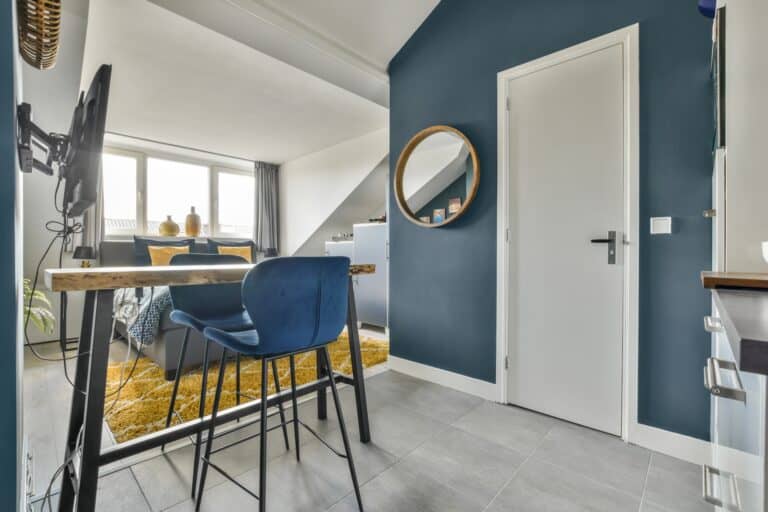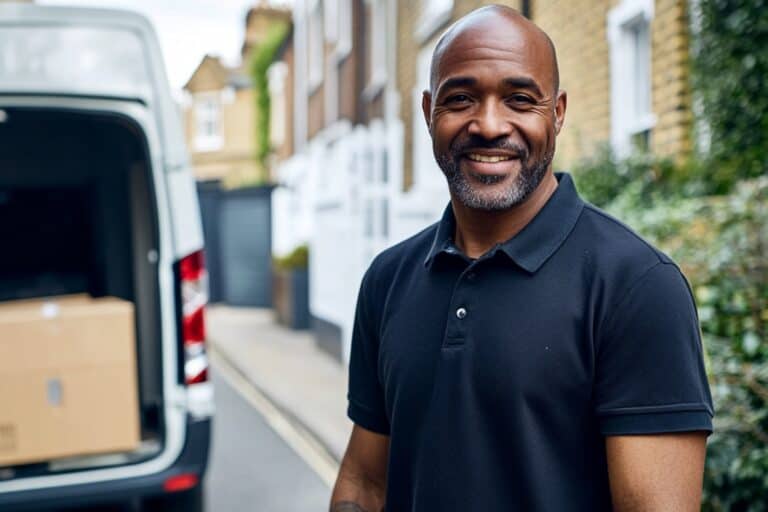Just moved? This guide on how to settle into a new home after moving offers practical steps to make your transition smooth and stress-free. Discover essential tips for preparing your new space, unpacking efficiently, and settling into your neighbourhood. From confirming move-in dates and getting removal quotes to deep cleaning every room and adding personal touches, this guide covers everything you need to know to make your new house feel like home.
Key Takeaways
- Prepare your new home before moving in by confirming dates, getting removal quotes, and doing a deep clean to ensure a smooth move.
- Complete essential tasks upon arrival, like checking for repairs, setting up utilities, and locating key functions for a comfortable first night.
- Unpack and personalise your new home efficiently by prioritising essential rooms, adding personal touches, and setting up a daily routine to feel settled.
Prepare Your New Home Before Moving In
It’s imperative to prepare your new home in Ilford for a smooth and hassle-free move. Here are some steps to follow:
- Confirm your moving date with conveyancers and house sellers to avoid any last-minute surprises.
- Get quotes on removal costs to find the best option that suits your budget and needs.
- Have a big clear-out before moving to reduce the number of items to transport.
Pack essentials for moving day, including cleaning supplies, phone chargers, and temporary furniture. These steps will help you settle into your new house more efficiently and make the transition smoother.
Deep Clean Every Room
Every room in your new home should be deep cleaned before you start unpacking. This ensures that all hard-to-reach areas are cleaned properly and helps remove any negative energy left by previous owners, creating a fresh start.
A thorough cleaning will make your new house feel truly yours and ready for a housewarming party.
Check Safety Features
It’s of utmost importance to make your new home a safe environment. Familiarise yourself with the location of the smoke alarms and carbon monoxide detectors, and test them to ensure they are functioning properly. Verify that the fire extinguishers are accessible and in good working condition.
These steps will help you create a safe and secure environment for your family.
Change Locks and Security Codes
Enhance your new home’s security by changing the locks on all external doors as soon as possible. This step ensures that you are the only one with access to your new place. Don’t forget to reprogram the garage door remote and security system codes to further secure your home.
These measures are instrumental in fostering a safe environment in your new house.
Essential Tasks Upon Arrival
There are several important tasks to complete upon your arrival at your new home. Start with a thorough walkthrough to check for any agreed-upon repairs and ensure that all outlets, switches, and fixtures are in working order. Set up utilities and connectivity, including:
- electricity
- gas
- water
- Internet
to make your first night comfortable. Finally, locate important functions like the circuit breaker and water valve to be prepared for emergencies.
These steps will help you stay organised and make your new house feel like home.
Do a Walkthrough
Walking through your new home to check for any agreed-upon repairs and measure spaces for furniture is a critical step. If an in-person walkthrough isn’t possible, consider scheduling a virtual one with your realtor or using 3-D scans to explore the space remotely.
If an in-person walkthrough isn’t possible, consider scheduling a virtual one with your realtor or using 3-D scans to explore the space …
This ensures that your new house is ready for move-in and helps you plan your space effectively.
Set Up Utilities and Connectivity
For a seamless transition, setting up utilities and connectivity is a must. Plan ahead to ensure that services like electricity, gas, water, and internet are ready on your move-in date. Contact utility suppliers in advance to notify them of your move and arrange the transfer or setup of services. Taking final meter readings at your old home and passing them on to the respective suppliers can help you stay organised and avoid any billing issues.
Locate Important Functions
It’s important to know the locations of key functions in your new home, like the stopcock, fuse box, and utility meters. Make a list of these locations to ensure you are prepared for any emergencies, such as water leaks or power outages.
This knowledge will help you stay organised and ensure that your new house is functioning properly.
Unpacking Strategies
Though unpacking might seem overwhelming, adopting the right strategies can streamline the process. Start unpacking essentials first to keep your home running in the short term and make your first night more comfortable. When you stay organised during unpacking, it will make decorating your new home a more enjoyable and less stressful experience. This can help create a smoother transition into your new space.
Create an unpacking plan to prioritise rooms based on necessity, such as bedrooms, kitchens, and bathrooms. These strategies will help you stay organised and make your new house feel like home.
Start Unpacking Essentials First
Prioritise unpacking essentials like the kitchen and bedrooms to make your new home functional quickly. Sorting out the kitchen sooner rather than later reduces the cost of takeout meals and provides a place for family congregating.
Unpacking the bedroom before tackling the rest of the house ensures restful sleep before dealing with more boxes. This approach will make the unpacking process more manageable and help you settle into your new place.
Stay Organised When Unpacking
Staying organised when unpacking is key to a smooth transition. Label moving boxes by room to expedite the unpacking process and ensure items are placed where they belong. Organising spaces like closets and cabinets before unpacking can save time and effort later.
Using an inventory list helps keep track of belongings and ensures nothing is missed. Regularly getting rid of clutter can prevent additional stress and make your home more relaxing.
Create an Unpacking Plan
A structured unpacking plan is key to prioritising rooms according to their necessity. Focus on setting up bedrooms, kitchens, and bathrooms first to make your home functional swiftly. This approach helps stay organised, reduces clutter, and ensures that essential items are unpacked first.
TIP
Unpacking room-by-room also saves time by keeping the process orderly. It makes it easier to find things as you know exactly where each item belongs.
Personalise Your New Space
To make your new home in Ilford feel like your own, personalization is key. Incorporate family photos, add personal touches, and start decorating to express your individuality and create a more inviting space.
These steps will help you settle into your new house and make it feel uniquely yours.
Decorate with Family Photos
Family photos can make a new house feel like home and provide comfort. Create a gallery wall that mixes artwork with personal photos for a personal touch. Using similar frames on matching picture ledges gives a cohesive feel while letting the photos stand out.
Printing family photos in black and white can give them a cohesive look when displayed. This approach will help create a comforting environment in your new space.
Add Personal Touches
To make your new home uniquely yours, adding personal touches is of great importance. Select decorative items that reflect your taste and style, such as artwork you love or mementos from your travels. Use rugs to add colour, texture, and pattern to different areas of a room.
Create a cosy atmosphere by layering lighting with both overhead lights and softer, warmer table lamps. These tips will help transform your new house into a welcoming home.
Start Decorating
Starting the decorating process early helps avoid moving furniture multiple times and ensures a more settled-in feel. Plan the placement of your art and furniture to avoid unnecessary rearrangements. This approach will make your new house feel like home sooner and prepare you for a housewarming party.
Get to Know Your New Neighborhood

Familiarising yourself with your new neighbourhood is an important step towards feeling at home in Ilford. Meeting your neighbours, exploring local amenities, and joining local clubs and groups can help you settle into your new place.
These activities will help you build a support network and feel more connected to your new environment.
Meet Your Neighbours
Introducing yourself to your new neighbours can lay the foundation for future friendships. Answering the door when neighbours call can make a positive first impression and help establish initial connections. Utilising local communal spaces like pools or clubhouses can offer casual settings to meet neighbours.
Asking neighbours for recommendations on grocery stores or places to eat can keep conversations going and provide useful local insights.
Explore Local Amenities
Exploring your new neighbourhood on foot or by bike can help you become familiar with local shops, parks, and amenities. Visiting local parks and amenities helps you discover new favourite spots and meet neighbours. You can also find out your weekly trash and recycling schedule online or by asking neighbours.
These activities will help you settle into your new neighbourhood and feel more at home in your local area.
Join Local Clubs and Groups
One excellent way to meet new people in Ilford is by joining local clubs and groups. It’s also a great way to get involved in the community. Finding neighbours with similar interests can lead to deeper connections and shared activities. Participating in community activities will help you feel more settled and integrated into your new environment.
This approach will help you build a support network and make new friends.
Update Important Information
It’s necessary to update your important information with various institutions after moving. Notify your healthcare providers, other financial institutions, employers, and local authorities of your new address to ensure all records are up to date. These steps will help you stay organised and avoid any issues with correspondence or services.
Secure Important Documents
Gather and organise essential documents like:
- birth certificates
- passports
- insurance policies
- property records
Store these documents in a secure place like a locking file cabinet or a fireproof safe to protect them from damage or theft.
This practice will help you stay organised and ensure that your important documents are safe, whether at home or when visiting the post office.
Help Children and Pets Adjust
For a smooth transition, it’s necessary to help children and pets adjust to the new home. Involve children in the unpacking process, create familiar spaces for kids and pets, and involve them in the moving process.
These steps will help them feel more comfortable and settled into your new house.
Create a Familiar Space for Kids
For the comfort of children, it’s important to set up an environment in the new home that feels familiar to them. One effective way to create a familiar space is by recreating the layout of their previous bedroom in the new house. This can provide comfort and stability for children during the moving process.
Including familiar objects like their favourite toys and family photos can also make the transition smoother.
Designate a Safe Area for Pets
Providing a quiet space with familiar items can help reduce stress for pets and make them feel more at home. Secluding pets from the hustle and bustle of moving days in a quiet room can significantly reduce their stress and anxiety.
Using familiar items such as their old bed, toys, and feeding bowls can help pets feel more secure in a new environment. This approach will help create a safe environment for your pets in your new home.
Involve Them in the Process
Involving children in the moving process can help them feel valued and integral to the transition. Letting children pack a small box of their favourite belongings reinforces the idea that their contributions are valuable in the move. Allowing children to choose the colours or themes for their new room can help them feel more involved and settled.
Engaging children in small tasks like unpacking their toys or clothes can make the transition smoother.

Establish a Routine
By providing structure and predictability, establishing a daily routine helps stabilise mental health. It can also help in minimising the feeling of being overwhelmed and promote a sense of stability.
Resume regular activities, plan daily tasks, and schedule maintenance work to create an organised and structured daily routine in your new Ilford home. This approach will help you stay organised and feel more settled in your new house.
Resume Regular Activities
Resuming regular activities post-move helps in maintaining a sense of familiarity and continuity. Engaging in familiar activities can significantly reduce all the stress associated with moving to a new place. Quickly establishing a daily routine can help combat feelings of disorientation and help you regain control over your environment.
You will feel more settled and comfortable in your new home as a result of this. It will help you adjust to your new surroundings.
Plan Daily Tasks
Planning daily tasks can prevent feelings of aimlessness and provide a sense of accomplishment. In the initial days after moving, a well-structured daily plan ensures that essential tasks are not overlooked.
This approach will help you stay organised and avoid feeling overwhelmed.
Schedule Maintenance Work
Scheduling maintenance work early helps avoid disruptions and ensures your home remains functional and comfortable. Proactive maintenance scheduling can help identify potential issues early and result in significant time and cost savings in the long run.
This will help you stay organised and ensure your new house is in working order.
Take Time to Relax
Given that moving house is one of life’s most stressful events, taking breaks and relaxing is of utmost importance. Taking time off work after moving can help you adjust and recover from the mental and physical effort of the move.
Enjoying and relaxing in your new home can help you settle in, allowing you to appreciate your new space and explore your new area. This is the perfect opportunity to unwind and enjoy your new life.
Summary
Settling into a new home in Ilford involves careful planning and organisation. From preparing your new house before moving in, unpacking strategically, personalising your space, getting to know your new neighbourhood, updating important information, helping children and pets adjust, establishing a routine, to taking time to relax, each step is vital. These tips will help you transition smoothly and make your new house feel like home. Embrace the change, enjoy the process, and remember, every step brings you closer to creating a comfortable and welcoming new home.
Frequently Asked Questions
Why is it important to prepare my new home before moving in?
It’s important to prepare your new home before moving in because it reduces stress and makes the transition smoother.
What should I prioritise unpacking first?
You should prioritise unpacking essentials like the kitchen and bedrooms to make your new home functional quickly. This will help you settle in and feel more at home sooner.
How can I help my children adjust to the new home?
You can help your children adjust to the new home by involving them in the unpacking process, creating familiar spaces, and making them a part of the moving process. This will help them feel more comfortable and at ease in the new environment.
Why is it important to meet my new neighbours?
It’s important to meet your new neighbours because it helps build a support network and provides insights about the local area. Connecting with those around you can make your neighbourhood feel like a community.
How can I stay organised during the unpacking process?
To stay organised during unpacking, label boxes by room, create an inventory list, and make an unpacking plan for a smooth transition.






